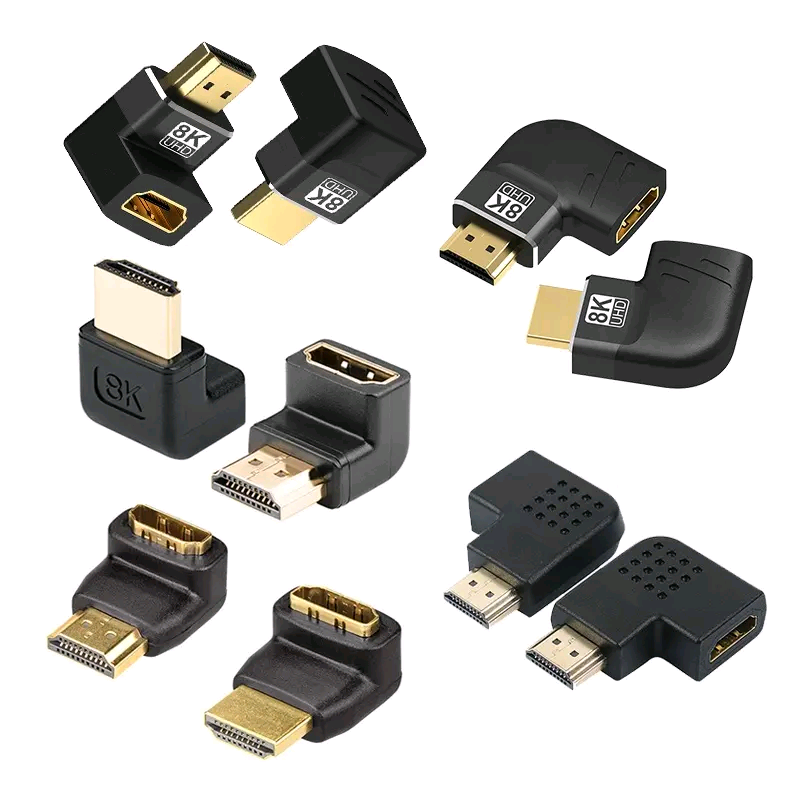In the era of ultra-high-definition content, 8K resolution is becoming the new standard for visual clarity and sharpness. Whether you’re upgrading your home entertainment system, setting up a professional workstation, or creating a high-end display setup, the 8K HDMI adapter is essential for achieving optimal video quality. As an 8K HDMI adapter manufacturer, we want to guide you through the correct use of these adapters, ensuring you get the best performance from your 8K-enabled devices. In this article, we’ll explain how to properly use an 8K HDMI adapter, from setup to troubleshooting, so you can enjoy flawless 8K video and audio transmission.
Understanding the Importance of an 8K HDMI Adapter choose 8K HDMI Adapter manufacturer
8K HDMI Adapter factory products are built for high-performance, capable of transmitting 8K video signals at 60Hz, or 4K video signals at 120Hz. Before diving into how to use an 8K HDMI adapter, it’s crucial to understand its importance in your 8K setup.
An 8K HDMI adapter allows you to connect devices that feature HDMI 2.1 ports—such as the latest gaming consoles, 8K TVs, and high-performance PCs—ensuring compatibility between your source device and display. Without a proper adapter, you could face issues like lower resolution, poor image quality, or lack of color depth.
The key advantage of using a high-quality 8K HDMI adapter supplier is that the adapter is engineered to handle the massive data bandwidth required for 8K transmission. An unqualified or lower-quality adapter might not support the necessary resolutions or could introduce lag and signal degradation, leading to a subpar viewing experience. Therefore, selecting the right adapter from a trusted 8K HDMI adapter factory is critical to achieving the best picture quality.
Setting Up Your 8K HDMI Adapter Correctly
Setting up your 8K HDMI adapter requires more than just plugging it in. To ensure the adapter performs optimally, follow these steps carefully:
-
Check Compatibility
Ensure that your devices support 8K resolution. This includes both the source device (such as a gaming console, PC, or media player) and the display (such as an 8K TV or monitor). While the adapter itself may support 8K, it’s essential that both connected devices do as well. -
Choose the Right Cable
An 8K HDMI adapter must be used with high-quality HDMI cables that support HDMI 2.1. Using outdated cables will not allow full 8K resolution and may result in signal loss or video artifacts. -
Connect the Adapter
Plug the adapter into the HDMI port of your source device (such as a laptop or gaming console) and connect the HDMI cable to the adapter and the 8K display. Ensure that both connections are secure to avoid intermittent signal disruptions. -
Adjust Settings on Your Device
Once your devices are connected, navigate to the display settings on your source device. In some cases, you may need to enable 8K resolution manually in the system’s display settings. Check your display settings to confirm that the 8K output is activated.
By following these steps, you ensure that the 8K HDMI adapter functions correctly, providing a flawless 8K viewing experience. It’s important to understand that improper setup can lead to poor performance, so following the manufacturer’s instructions is essential.
Maintaining Optimal Performance with Your 8K HDMI Adapter
To ensure that your 8K HDMI adapter continues to deliver high-quality video and audio over time, you should follow a few maintenance practices:
-
Avoid Physical Damage
Since 8K HDMI adapter suppliers prioritize durability, it’s important to handle the adapter carefully to avoid wear and tear. Ensure that the adapter is not bent, pinched, or exposed to excessive heat or moisture. If the cable or adapter is damaged, it can degrade the signal or cause it to cut out entirely. -
Keep Ports Clean
Dust and dirt can accumulate in the HDMI ports over time, affecting the signal transmission. Clean the HDMI ports on both the source device and the display regularly with a dry microfiber cloth. Avoid using liquid cleaners, as they can damage the ports. -
Update Device Firmware
Some devices, such as gaming consoles and 8K TVs, require firmware updates to ensure full compatibility with the latest HDMI standards. Keep your devices up-to-date to avoid performance issues when using the 8K HDMI adapter. -
Check for Cable Integrity
Ensure that the HDMI cable you are using is not damaged and is capable of transmitting 8K signals. Over time, cables can degrade, especially if they are frequently moved or bent. If you experience signal dropouts or lower-quality video, try replacing the cable or testing it with another device.
By performing regular maintenance and ensuring that your 8K HDMI adapter is in good condition, you can enjoy optimal performance for years to come.
Troubleshooting Common Issues with 8K HDMI Adapters
Despite your best efforts, there might be times when the 8K HDMI adapter doesn’t work as expected. Here are some common issues and how to troubleshoot them:
-
No Signal or Blank Screen
If you’re seeing a blank screen, double-check that the 8K HDMI adapter is securely plugged in on both ends. Additionally, ensure that your display is set to the correct input source. If the issue persists, test the adapter with another device to rule out a faulty connection. -
Reduced Resolution or Poor Picture Quality
If your display isn’t showing in full 8K resolution, make sure both your source device and display support 8K. If your HDMI cable is outdated or low quality, it could be the cause of poor resolution. Using a certified HDMI 2.1 cable can resolve this issue. -
Audio Not Syncing with Video
If there’s a lag between the audio and video, try adjusting the audio settings on your source device. Many modern devices allow you to adjust audio output settings, such as delay or synchronization. -
Intermittent Connection
If the connection drops periodically, the HDMI ports or the cable could be the issue. Test the adapter and cable on a different device to check for faults. If everything is in working order, but the issue persists, you may need to contact the 8K HDMI adapter supplier for a replacement.
By addressing these issues promptly, you can maintain an optimal viewing experience with your 8K HDMI adapter.
Conclusion
Using an 8K HDMI adapter correctly is key to ensuring that you get the full benefits of ultra-high-definition video and audio. By understanding how to set up and maintain the adapter, you can avoid common issues and enjoy a seamless 8K experience. Whether you’re upgrading your home theater system or equipping a professional display setup, choosing a reliable 8K HDMI adapter factory and 8K HDMI adapter supplier is essential for the best results. Follow the tips and troubleshooting advice provided in this article to maximize the performance of your 8K setup and future-proof your tech investments.

